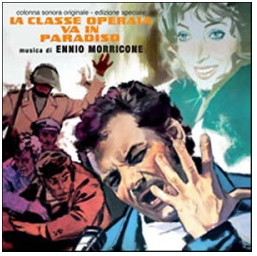主页--->m-comment-000--->mb-comment-011-106
|
电脑版 |
|||||||||||||||||||||||||||||||||
布罗克斯顿评说莫里康内 MB-011-106 |
||||||||||||||||||||||||||||||||||
FA7110 La classe operaia va in Paradiso / The Working Class Goes to Heaven / 工人阶级上天堂 |
||||||||||||||||||||||||||||||||||
作者 乔纳森·布罗克斯顿 (Jonathan Broxton) |
||||||||||||||||||||||||||||||||||
ENNIO MORRICONE 评论,第11部分 011-106 |
||||||||||||||||||||||||||||||||||
 |
||||||||||||||||||||||||||||||||||
LA CLASSE OPERAIA VA IN PARADISO (1971年) La Classe Operaia Va In Paradiso——在英语中被称为 The Working Class Goes To Heaven 和 Lulu the Tool——是一部由埃利奥·佩特里执导的政治剧。这部电影由吉安·玛丽亚·沃隆特(Gian Maria Volonté)饰演卢卢·马萨(Lulù Massa),他是一家工厂的工人,他的老板以极高的效率为借口,以减少同事的工资并期望他们提高生产力。当卢卢在一次工作事故中失去了一根手指,并突然发现自己受到与同事一样冷漠的工作条件时,他开始意识到自己已被资本主义制度用作“工具”,并开始与工会成员和学生合作,要求更好的待遇。 莫里康内为其中几部左翼支持工会的戏剧配乐,其中许多感觉相似。La Classe Operaia Va In Paradiso可能是其中最好的,将完整的管弦乐队与I Cantori Moderni Di Alessandroni合唱团以及他闻名的通常的另类声音设计相结合。主标题“La Classe Operaia Va In Paradiso”是一首不寻常的断断续续的进行曲,融合了奇异的音效——鸭子嘎嘎声、经过高度处理的枪声,经常演变成飘动的效果——与模糊的喜剧小号线和说唱军鼓相映成趣,随着节奏的进行而变得强劲而有节奏;主题的重复性显然是在评论卢卢作为高度机械化工业机器中的齿轮的地位,而不时出现的高度古典的小提琴乐句为这个想法提供了一个抒情的对立面,浪漫化了工会主义者为之奋斗的资本主义制度的自由。 其中许多想法在8分钟的“Sinfonia dell'Ottimista”中得到了扩展,尽管莫里康内确实经常回到主旋律,但它比主标题更抽象和更具挑战性,因为它有长时间的质感和不和谐。“Metamorfosi”、“Tempi di Lavorazione”和“Alienazione”同样很奇怪,重复主标题的节奏,对抗咄咄逼人、听起来残酷的电吉他悸动和更令人不安的管弦乐织体,进出乐曲。“Il Sogno”是一首具有挑战性的作品,它主要将鲜明的木管乐器效果与飘动的枪声相结合,但随后演变成钢琴、低音弦乐和低音铜管的令人不安的纹理作品。实际上,只有“Pazzia da Lavoro”从这个核心声音中提供了任何真正的多样性,最初将舞蹈般的曼陀林主题与威胁性的铜管和弦并置,然后最终为打击乐、钢琴和狡猾的弦乐提供了主标题主题的节奏部分的大规模陈述。 《La Classe Operaia Va In Paradiso》是一首让人难以爱的乐曲,尽管莫里康内显然做到了,因为它经常出现在他的音乐会曲目中,让那些只听过《使命》和《天堂电影院》的人感到困惑。然而,如果这种咄咄逼人的莫里康内实验主义一直让你着迷,那么这些年来,乐谱已经发行了无数次; 我在这里写的版本是意大利厂牌 GDM 的 2009 年限量版,它采用了原始的 8 首曲目 LP 专辑演示并将其扩展到一个多小时,在核心材料上进行了多种变化。 曲目列表: 1. La Classe Operaia Va In Paradiso (5:20), 2.Metamorfosi (2:10), 3.奥蒂米斯塔交响乐团 (8:16), 4.发明 (2:58), 5.Tempi di Lavorazione (4:06), 6.Il Sogno (4:36), 7.Pazzia da Lavoro (2:23), 8.外星人 (3:45), 9.La Classe Operaia Va In Paradiso #2 (3:46), 10.Metamorfosi #2 (1:55), 11.Sinfonia dell'Ottimista #2 (10:30), 12.外星人#2(5:45),13。发明家 #2 (2:24), 14.La Classe Operaia va In Paradiso #3 (6:24).GDM Club 7062,64 分 18 秒。 |
||||||||||||||||||||||||||||||||||
2021.3.6 |
||||||||||||||||||||||||||||||||||
|
| ||||||||||||||||||||||||||||||||||
以下是原文
| ||||||||||||||||||||||||||||||||||
ENNIO MORRICONE REVIEWS, Part 11-106 |
||||||||||||||||||||||||||||||||||
LA CLASSE OPERAIA VA IN PARADISO (1971) La Classe Operaia Va In Paradiso – known variously in English as The Working Class Goes To Heaven and Lulu the Tool – is a political drama directed by Elio Petri. The film stars Gian Maria Volonté as Lulù Massa, a worker at a factory whose extreme efficiency is used as an excuse by his bosses to pay his colleagues less and expect higher productivity from them. When Lulù loses a finger in an accident at work, and suddenly finds himself subject to the same uncaring work conditions as his colleagues, he begins to realize that he has been used as a ‘tool’ by the capitalist system, and begins to work with unionists and students to demand better treatment. Morricone scored several of these left-wing pro-union dramas, and many of them feel similar. La Classe Operaia Va In Paradiso may be the best of them, combining a full orchestra with the I Cantori Moderni Di Alessandroni choir and the usual array of offbeat sound design for which he was so famous. The main title, “La Classe Operaia Va In Paradiso,” is an unusual staccato march that incorporates bizarre sound effects – duck quacks, highly processed gunfire that often morphs into a fluttering effect – against a vaguely comedic trumpet line and rapped snares, that becomes robust and rhythmic as it progresses; the repetitive nature of the theme is clearly commenting on Lulù’s place as a cog in a highly mechanized industrial machine, while the highly classical violin phrases that come in from time to time offer a lyrical counterpoint to the idea, romanticizing the freedom from the capitalist system for which the unionists fight. Many of these ideas are expanded upon in the 8-minute “Sinfonia dell’Ottimista,” which is if anything even more abstract and challenging than the main title with it’s extended periods of texture and dissonance, although Morricone does return to the main theme regularly. “Metamorfosi,” “Tempi di Lavorazione” amd “Alienazione” are similarly bizarre, repeating the main title rhythms against an aggressive, brutal-sounding electric guitar throb and more unsettling orchestral textures that move in and out of the piece. “Il Sogno” is a challenging piece that mostly pairs stark woodwind effects with the fluttering gunfire idea, but then morphs into a disquieting textural piece for piano, low strings, and low brass. Really, only “Pazzia da Lavoro” offers any real diversity from this core sound, initially juxtaposing a dance-like mandolin motif against threatening brass chords, before eventually offering a large scale statement of the rhythmic part of the main title theme for percussion, piano, and sly strings. La Classe Operaia Va In Paradiso is a tough score to love, although Morricone clearly did as it features regularly in his concert repertoire, confounding those who only turned up to hear The Mission and Cinema Paradiso. However, if this sort of aggressive Morricone experimentalism has always been fascinating to you, the score has been released numerous times over the years; the version I’m writing about here is the 2009 limited edition from the Italian label GDM, which takes the original 8-track LP album presentation and expands it to more than an hour, with several variations on the core material. Track Listing: 1. La Classe Operaia Va In Paradiso (5:20), 2. Metamorfosi (2:10), 3. Sinfonia dell’Ottimista (8:16), 4. Inventario (2:58), 5. Tempi di Lavorazione (4:06), 6. Il Sogno (4:36), 7. Pazzia da Lavoro (2:23), 8. Alienazione (3:45), 9. La Classe Operaia Va In Paradiso #2 (3:46), 10. Metamorfosi #2 (1:55), 11. Sinfonia dell’Ottimista #2 (10:30), 12. Alienazione #2 (5:45), 13. Inventario #2 (2:24), 14. La Classe Operaia Va In Paradiso #3 (6:24). GDM Club 7062, 64 minutes 18 seconds. |
||||||||||||||||||||||||||||||||||
March. 6, 2021 |
||||||||||||||||||||||||||||||||||
在线音乐试听 |
||||||||||||||||||||||||||||||||||
|
||||||||||||||||||||||||||||||||||
 |
||||||||||||||||||||||||||||||||||
Jon 是一位电影音乐评论家和记者,自 1997 年以来一直担任全球最受欢迎的英语电影音乐网站之一 Movie Music UK 的编辑和首席评论员,并且是国际电影音乐评论家协会 (IFMCA) 的主席。在过去的 20多 年中,Jon 撰写了 3,000 多篇评论和文章,并进行了多次作曲家采访。在杂志刊物方面,乔恩曾为《电影配乐月刊》、《原声带杂志》和《电影音乐》等出版物撰写评论和文章,并为普罗米修斯唱片公司的两张经典 Basil Poledouris 配乐专辑《Amanda》和《Flyers / Fire on the Mountain》撰写了衬垫注释。他还为汤姆·胡佛 (Tom Hoover) 于 2011 年出版的《Soundtrack Nation: Interviews with Today's Top Professionals in Film, Videogame, and Television Scorering》一书撰写了一章。在1990年代后期,乔恩是伦敦皇家爱乐乐团的电影音乐顾问,并与他们合作拍摄了约翰·德布尼(John Debney)的音乐电影《相对价值》(Relative Values)和奥利弗·海斯(Oliver Heise)的音乐《佛陀的指环》(The Ring of the Buddha),以及与兰迪·纽曼(Randy Newman)合作的一系列音乐会。2012年,乔恩在波兰克拉科夫举行的第五届年度电影音乐节上担任“电影节学院”主席。他是作曲家和作词家协会的成员,该协会是作曲家、作词家和词曲作者从事电影、电视和多媒体工作的首要非营利组织。 |
||||||||||||||||||||||||||||||||||
2023.12.10 |
||||||||||||||||||||||||||||||||||
2023 手机版 |
||||||||||||||||||||||||||||||||||
|
||||||||||||||||||||||||||||||||||













